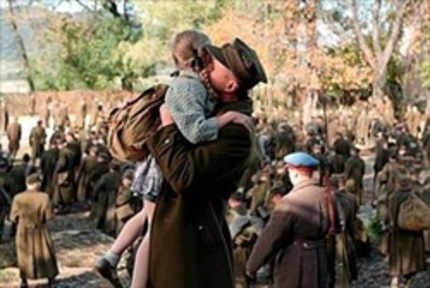Katyń review

Veteran Polish director Andrzej Wajda’s Katyń is a multi-stranded WW2 drama that sombrely recounts the story of the Katyń forest massacre of 1941, where nearly 50,000 Polish POWs were systematically murdered at the hands of the Russian secret police under order of Stalin. The crime was subsequently denied by the Russians and blame shifted to the Germans when uncovered in 1943, the truth hidden until 1990 when the USSR finally admitted responsibility. Katyń’s attention is levelled at the families (mostly wives) and friends of the murdered POWs as they anxiously wait in vain for their husbands to return, unaware of their tragic plight. Nominated for the best foreign language film Oscar in 2008 and nearly two years since its première in Warsaw it’s making a welcome cinematic debut in the UK on 19th June.
The narrative threads a number of stories together, some directly linked, others not, and builds a picture of collective mourning as the knowledge that these men are dead reaches their loved ones through disparate sources. As the lies abide and denials persist over who's culpable, a mosaic of guilt, trauma and anger emerge from those grief-stricken and dealing with the news. Making this an ensemble piece means the overall impression is one of a whole nation reeling from the war, and specifically the repression of this crime, so Wajda’s film feels very much like a historical document. Knowledge that the director’s father was one of the unfortunate POWs lends a greater understanding to the reverence with which the material is treated. That’s not to say it’s un-cinematic, and the final massacre is brilliantly and terrifyingly filmed, as the brutal efficiency of the slaughter becomes apparent. A lone bulldozer mimics the bleak, mechanised nature of the production-line murder, permeating the soundtrack, a harbinger of doom.
Our sympathy with the characters is likewise collective, cumulative and, to an extent, accordingly distanced as we’re presented with multiple draws on our attention. Covering so many narratives does have its problems, and there are times when the film veers quite awkwardly between underdeveloped stories. Other issues surround the Holocaust genre (strictly speaking the crime wasn’t perpetrated by the Nazis and so isn’t actually part of The Holocaust, but is near enough in film genre terms) and the set of signifiers that have become associated with it – they become necessary clichés if you like. Katyń does its best to avoid these, but there are times when they threaten to impose; weeping children running after trains, helpful priests and abused intellectuals. I’m not doubting the factual veracity of any of these but they’re familiar nonetheless.
A skilfully composed, if overly complex film, Katyń recounts a fascinating and appalling period of modern history with restraint and compassion. The score by Krzystof Penderecki is superb, balancing melancholy, fear and sympathy whilst avoiding sensationalism or over-sentimentality. POW dramas are hardly thin on the ground but this is worth seeking out for its integrity alone.







